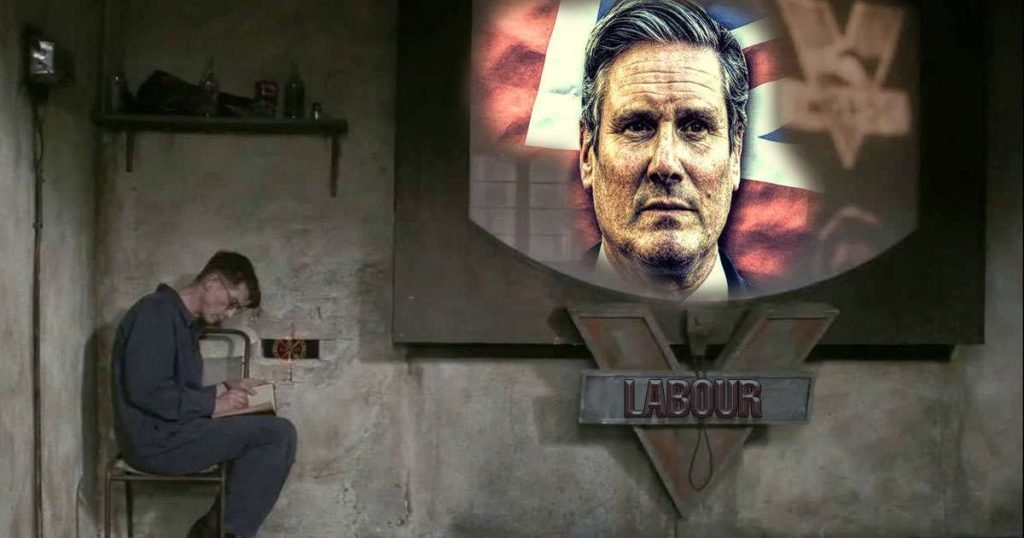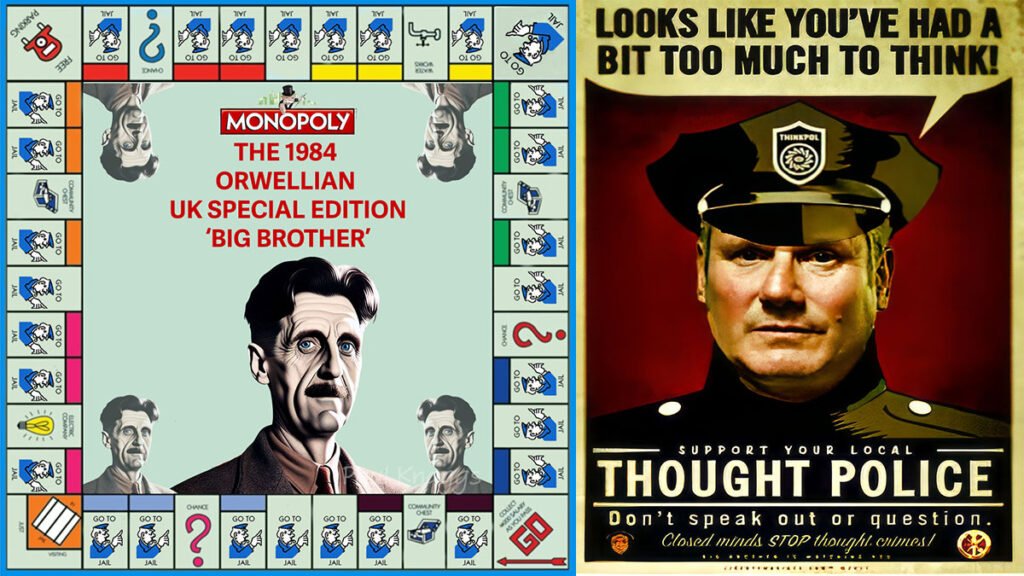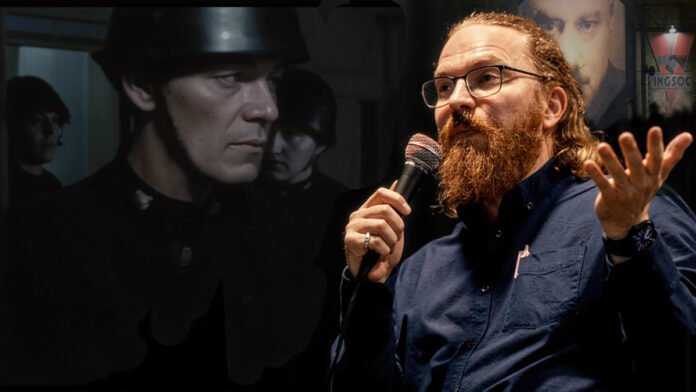Britain’s Authoritarian Playbook for Silencing Dissent
Democracy Dies in the Dawn Light…
What does it tell us about the state of British democracy when ten Metropolitan Police officers can storm a journalist’s home at dawn, armed with illegally obtained warrants, simply because a journalist dared to report uncomfortable truths about Gaza?
The answer arrived last week in a damning court ruling that should make every defender of press freedom, and indeed, every British citizen who believes in the rule of law, sit up and take notice. Judge Mark Lucraft KC didn’t merely slap the Metropolitan Police on the wrist; he delivered a judicial thunderbolt that exposed the rotten foundations of Britain’s increasingly authoritarian approach to dissent.
The victim of this state-sanctioned intimidation was Asa Winstanley, an investigative journalist whose crime was to write critically about Israel’s bombardment of Gaza and Britain’s complicity in it. At 6 a.m. on 17 October 2024, his North London home was ransacked not because he posed any genuine threat to national security, but because his reporting threatened something far more precious to our political establishment: the carefully constructed narrative that shields British foreign policy from scrutiny.
In the land of Lilburne, Milton, Paine, and Orwell, where free speech was once a birthright carved into the soul of our democracy, we are now watching its slow strangulation played out like a tired farce with a sinister edge. Dawn raids, designed for maximum psychological impact, not justice. Loosely defined terrorism charges that wouldn’t stand five minutes in a court not bent to power. Devices seized that amount to digital book-burning and the silencing of political heretics. And always, the targets are the same: journalists, truth-tellers, and critics who dare expose Britain’s complicity in foreign atrocities. The pattern is no longer coincidence, it’s policy.
The Metropolitan Police claimed they were investigating “possible offences” under the Terrorism Act, that bloated, catch-all legislation now routinely deployed as a Swiss Army knife against dissent. Their rationale? That Asa Winstanley may possess a “mindset conducive to the support of Hamas.”
Let that sink in: not evidence of a crime, but the suggestion of a ‘thought’, an attitude, that might be problematic. What exactly separates that from basic human empathy for civilians being buried under rubble in Gaza? Nothing, apparently. In Britain today, feeling too deeply, questioning too openly, or caring too loudly has become a potential act of terrorism. In our compassion, we are all suspects. In our empathy, we are all guilty of “thought crime”.
Judge Lucraft’s ruling was as devastating as it was necessary. He found the raid unlawful and ordered all seized devices returned, condemning the police’s attempt to retrospectively legitimise their actions as “deeply troubling”. His warning that “any warrant seeking material in the hands of a journalist requires extremely careful handling” reads like a judicial reminder of principles so basic they shouldn’t need stating, yet here we are.
But let’s not kid ourselves that this was simply police incompetence. The warrants were obtained based on reports from what Winstanley’s legal team described as a “shadowy UK-based counter-extremism think tank”, almost certainly one of the well-funded pro-Israel lobby groups that have spent decades embedding themselves within British institutions. These organisations operate with the smooth efficiency of a foreign influence network, maintaining cosy relationships with police, intelligence agencies, and politicians while masquerading as neutral experts.

This is how modern authoritarianism works in liberal democracies. You don’t need jackbooted thugs breaking down doors when you can simply outsource your dirty work to “think tanks” and “research organisations” that provide the intellectual veneer for political persecution. It’s neoliberalism’s answer to state repression: privatise the propaganda, but keep the police raids.
Some will argue that in an age of genuine terrorism threats, law enforcement must cast a wide net. This argument conveniently ignores the fact that the police admitted they had no proper basis for their warrants and failed to meet even minimal legal standards. When your counter-terrorism strategy depends on treating journalism as a form of extremism, you’ve already lost the plot.
The targeting of Winstanley fits a pattern that should alarm anyone who values press freedom. Journalist Richard Medhurst detained at Heathrow. Activist Sarah Wilkinson’s home ransacked. Just last week, award-winning radio and television presenter Richie Allen was arrested, details remain unclear due to legal restrictions, but Allen’s own words capture the chilling reality:
“Nobody in the fake alternative media, or as David Icke calls it The Mainstream Alternative Media, bothered to report that I was arrested last Wednesday, just before going on air to present my radio show. I breathe rarefied air. I’m the last journalist standing. How sad.”
In each case, the same playbook: dawn raids, device seizures, and terrorism charges that dissolve under legal scrutiny. This isn’t law enforcement; it’s state harassment designed to chill dissent and warn others what happens when you step out of line.
What makes this particularly insidious is how it weaponises our legitimate concerns about terrorism to silence criticism of foreign policy. The Terrorism Act was passed in the shadow of 7/7, sold to the public as necessary protection against genuine threats to our security. Instead, it has become a tool for criminalising solidarity with Palestinians and silencing those who document war crimes committed with British weapons.
What is needed is the right to print what one believes to be true, without having to fear bullying or blackmail from any side.
– George Orwell
Winstanley’s victory in court is a rare moment of accountability in a system increasingly rigged against independent journalism. His legal team, led by Tayab Ali of Bindmans and backed by the National Union of Journalists, successfully argued that the seized devices contained privileged journalistic material, including information relating to the Undercover Policing Inquiry. The court agreed, recognising what should have been obvious from the start: that journalists investigating state misconduct deserve protection, not persecution.

Yet even as we celebrate this victory, we must acknowledge how exceptional it is. Most journalists targeted by such tactics lack Winstanley’s resources or legal representation. Most activists facing terrorism charges for expressing solidarity with Palestinians will never see their cases reach court, let alone receive justice. The chilling effect is the point to make others think twice before challenging the established order.
This case exposes something rotten at the heart of British democracy: the use of “lawfare”, the politicised deployment of law enforcement, to silence critics of Israel and British foreign policy. Under both Conservative and Labour governments, we’ve seen an escalating campaign to redefine criticism of Israel as a form of extremism, regardless of the human rights violations being documented or the international law being broken.
“Freedom of the press, if it means anything at all, means the freedom to criticise and oppose.”
― George Orwell
We should not forget that Britain was deeply complicit in the years-long persecution of Julian Assange, another journalist whose crime was revealing inconvenient truths about Western foreign policy. Keir Starmer, now our Prime Minister, was Director of Public Prosecutions during crucial years of the Assange case, and his role in that judicial travesty has always been under scrutiny, leaving many questions unanswered about how British legal institutions became weapons in America’s war against WikiLeaks. The parallels between Assange’s treatment and what we’re witnessing today are unmistakable: the same abuse of legal processes, the same conflation of journalism with terrorism, the same determination to make examples of those who dare to challenge state power.
The Starmer government’s response to this judicial rebuke will be telling. Will they recognise the dangerous precedent set by weaponising terrorism laws against journalists? Will they investigate how lobby groups are able to trigger police raids with unsubstantiated reports? My guess is they will quietly move on, hoping public attention shifts elsewhere while the machinery of repression continues grinding away in the background.
After all, this is the same political establishment that spent years covering up illegal surveillance of activists, that routinely deploys injunctions to suppress embarrassing revelations, and that treats press freedom as a luxury to be suspended whenever convenient. They understand that democracy dies not in darkness, but in the cold light of dawn raids designed to terrify those who would illuminate uncomfortable truths.
The ultimate irony is that this authoritarian overreach undermines the very security it claims to protect. Real counterterrorism requires public trust and cooperation. When people see the state using terrorism laws to silence journalists and activists, that trust erodes. When police operate as the enforcement arm of foreign lobby groups, their legitimacy crumbles.
Judge Lucraft’s ruling offers a slight glimmer of hope, but it’s only the beginning. We need systematic reform of counter-terrorism legislation to prevent its abuse. We need transparency about how lobby groups influence law enforcement decisions. We need protection for journalists investigating state misconduct. And we need politicians brave enough to stand up to the pressure groups that have turned criticism of foreign policy into a thought crime.
Most urgently, we need to recognise that press freedom isn’t a luxury we can afford to sacrifice on the altar of political convenience. When the state begins targeting journalists for what they write, when solidarity with victims of war crimes becomes terrorism, when foreign lobby groups can trigger police raids with a phone call, democracy itself is under siege.
The dawn raid on Asa Winstanley’s home wasn’t just unlawful, it was a warning shot across the bow of every journalist, activist, and citizen who believes in accountability. The court’s ruling is a rare victory for justice, but it should never have been necessary in the first place. The real test now is whether we’ll learn from this abuse of power or simply wait for the next dawn raid to remind us what we’ve lost.
Support Independent Journalism Today
Our unwavering dedication is to provide you with unbiased news, diverse perspectives, and insightful opinions. We're on a mission to ensure that those in positions of power are held accountable for their actions, but we can't do it alone. Labour Heartlands is primarily funded by me, Paul Knaggs, and by the generous contributions of readers like you. Your donations keep us going and help us uphold the principles of independent journalism. Join us in our quest for truth, transparency, and accountability – donate today and be a part of our mission!
Like everyone else, we're facing challenges, and we need your help to stay online and continue providing crucial journalism. Every contribution, no matter how small, goes a long way in helping us thrive. By becoming one of our donors, you become a vital part of our mission to uncover the truth and uphold the values of democracy.
While we maintain our independence from political affiliations, we stand united against corruption, injustice, and the erosion of free speech, truth, and democracy. We believe in the power of accurate information in a democracy, and we consider facts non-negotiable.
Your support, no matter the amount, can make a significant impact. Together, we can make a difference and continue our journey toward a more informed and just society.
Thank you for supporting Labour Heartlands












